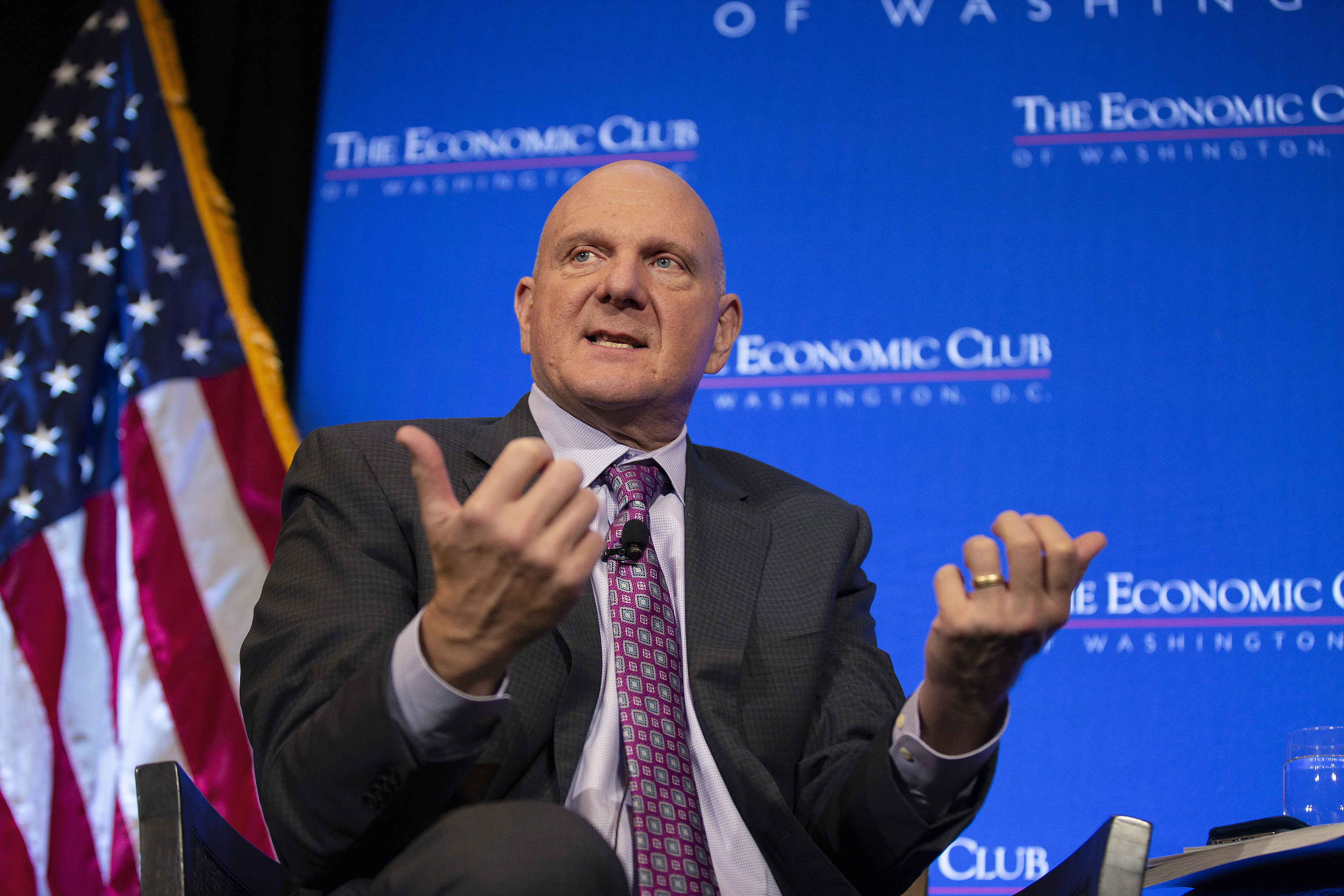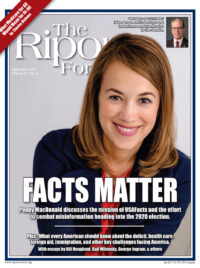
The internet has often been compared to having a library at one’s fingertips. And in many respects, it is. Never before in history have individuals had access to the amount of information they have today.
But with all of this information has come a downside. When people walk into a library, they have a fair amount of confidence that the material they may read in a book or magazine is going to be accurate. With information on the internet, there is no such guarantee.
To the extent that Americans are getting more and more of their news online, there are increasing concerns about whether all of this news is fact-based. There is no single arbiter of truth on the internet. But there are a growing number of organizations willing to step into the breach to perform this increasingly important role.
One of those organizations is USAFacts. Founded in 2017 by former Microsoft CEO Steve Ballmer, the non-profit, non-partisan organization is not seeking to break new ground when it comes to finding new sources of information about our society. But it is seeking to break new ground when it comes to how this information is presented.
Harnessing the power of computers and the internet – two areas where Ballmer has some expertise, to say the least — USAFacts has created a one-of-a-kind online platform that examines existing data from every level of government in America, and explores how this data is impacting American lives. “The goal,” Ballmer told Time magazine, “was to use numbers — about government revenue, spending and outcomes — to create a common set of facts that can serve as a foundation for the type of informed debate that is essential to our democracy.”
USAFacts is run on a day-to-day basis by former media executive Poppy MacDonald, who serves as the organization’s President. The Forum talked with MacDonald recently about the mission of USAFacts and how the group plans to combat misinformation heading into the presidential election next year.
____________________________________
RF: Talk for a moment about USAFacts. What is the mission of your group?
PM: USAFacts’ mission is to make government data available, accessible, and understandable to Americans. Our goal is to ensure debates begin with an agreement on facts. People may disagree on the solutions, but we can’t have real conversations without starting on the same footing.
Ensuring easy access to the facts is a big job. USAFacts grew out of a simple question: “How much do our combined federal, state, and local governments spend to help empower children and families to move out of poverty?” No single government source provides that answer — and there’s no federal law that requires the reporting of data on what is being spent and what progress is being made.
“Our goal is to ensure debates begin with an agreement on facts. People may disagree on the solutions, but we can’t have real conversations without starting on the same footing.”
There are still a host of barriers to the average citizen, or even a reporter on deadline, to finding answers. Some government reports are only available as PDFs, so you can’t do a quick search to find a figure. Other reports are simply spreadsheets. The IRS mailed us anonymized tax data on computer disks. These data sets are often difficult to find and are disconnected from other data or context, making it hard to see trends or reach well-rounded conclusions.
We bring together data from over 70 federal agencies, give it some context, and create visualizations, all with the goal of making it easy to understand and use.
RF: Washington is filled with think tanks and other research organizations. What sets USAFacts apart?
PM: We’re non-partisan, non-profit, and ad-free. We are the most comprehensive single source of government data. That data comes from more than 70 federal agencies, 50 states, thousands of local government entities, and all of it is publicly available government data. We don’t use projections or analysis because that could introduce bias; we only look back at what’s actually occurred and report that data.
Also, we’re in the other Washington: Washington State.
RF: What are some of the key facts about our nation and our government that you believe every American should know?
PM: We produce an Annual Report that highlights some of our key observations about the state of our nation based on government data.
This year, we focused on demographic changes that policymakers and voters might want to know about before making big decisions. Like the fact that the median age of Americans is rising. Seniors now make up 16% of the population, up from 11% in 1980. And America is becoming more diverse. Non-Hispanic White people are 61% of the population today, 29 years ago they were 76%. The population is growing nearly equally from people moving to the U.S. (48% of population growth from 2017-2018) as it is from births exceeding deaths (52% of growth). Fourteen percent of people in the population are first-generation immigrants, which hasn’t been that high since the early 1900s.
The American household is shrinking. More people are living alone, a greater share of the population is divorced, and there are more single-parent families and households without children. What does that mean? Fewer wage earners per household, possibly pushing down median household income.
All those trends have implications for our government resources, policies, and political and cultural shifts. But you can take any topic and what you’ll find in our reports are some of the facts that we think should at least be a starting point for our policy and political debates.
RF: Looking ahead to the 2020 election, how are you planning to counter the misinformation being spread online so people have the facts they need to make an informed decision?
PM: We conduct an annual State of the Facts Poll and this year it was illuminating on this very topic. From 2017 to 2018, an eight-point gap widened to a 22-point gap, with 61% of the public saying that using different facts causes more problems in the U.S. than political differences. That’s concerning. It also reinforces our mission to provide accurate, trusted data so Americans can have conversations about where we want to go as a country, even if different solutions emerge. It’s also encouraging that Americans see an opportunity to bridge partisan and ideological differences by beginning with the same set of facts.
“From 2017 to 2018, an eight-point gap widened to a 22-point gap, with 61% of the public saying that using different facts causes more problems in the U.S. than political differences.”
So, USAFacts will relaunch our Voter Center in the new year to support the upcoming election. This is a free tool that allows voters to enter their zip code to see candidates running for office right where they live, plus their positions on key policy issues. We’ll also show data about how the nation is doing on that same issue. You may see that one candidate supports school vouchers or higher teacher pay to improve schools. Alongside that, you’ll see that 36% of American children are proficient in reading and 34% are proficient in math at the 8th grade level. You’ll be able to look at trends in high school graduation rates as you consider the candidate you support.
RF: In that regard, what is the role of the average person in all this? The American public has more information at their fingertips than at any other time in history. How do you get them to use it?
PM: Data by itself isn’t always compelling, so we bring it to people in a way that is usable. We’re always working on special reports to provide a data-centric view of what’s in the news, what people find interesting in their own lives. We’ve seen a lot of interest in immigration data or how Social Security works. We create bite-sized pieces of information for social media that people can share. We’re always looking to present facts that may be counterintuitive. You probably assume that Medicaid and Medicare are more expensive on a per-person basis than private insurance, but do you know that they’ve both plateaued and have remained somewhat constant while private insurance costs continue to climb?

USAFacts was founded by former Microsoft CEO Steve Ballmer and we’re ad- and bias-free thanks to his civic activism. As we started collecting and analyzing data, we realized that this monumental task of bringing government data together in one place — data paid for with more than $5.9 billion of taxpayer dollars each year — could help Americans who want to understand simply what is going on in the country. Steve gets that we can’t just compile it, put it in context, make it look nice and hope people find it. We have to be proactive in getting the information in front of them. We believe they’ll see its value and share it with their family, their community, their readers and listeners.
RF: What about the media and our elected leaders? Do they have a responsibility in making sure people get the facts and not simply the spin? Or is that asking the impossible in this era of hyper-partisanship and ratings-driven reporting?
PM: Our State of the Facts Poll has clearly shown that voters and news consumers want to reward politicians and journalists who cite data. Yes, some will say it’s human nature to cite facts that support your beliefs. Editorial writers and talk show commentators do that. Partisans in our democratic system do that. But I think our poll shows that Americans expect there to be some “bottom line” facts that our elected officials should agree on as they debate solutions, and reporters should cite as they cover those debates and issues.
“Our poll shows that Americans expect there to be some “bottom line” facts that our elected officials should agree on as they debate solutions, and reporters should cite as they cover those debates and issues.”
We know it’s not always clear. Like do more acres of wildfire burned say more about our fire suppression budgets, climate change, random droughts, or arson? We work to bring context — and hope the users of our data do as well.
RF: Finally, a question about your other role — as the mother of two young kids. What advice do you have for parents who want their children to be informed about the world and are concerned with how, and where, they get their news?
PM: As a mother of two, and someone who worked in media (at POLITICO and Atlantic Media) before coming to USAFacts, I truly appreciate the value and role of an informed democracy. My advice to parents would be to encourage their children to seek multiple sources of information and discuss what they’re hearing with their families.
So many adults tell me that when they turn on two different media sources — Fox News and MSNBC, for example — they feel like they are hearing completely different versions of what’s happening in the world. Add social media and a proliferation of new information sources, it’s not surprising that both parents and their children are looking for something they know they can trust.
I’m hopeful that USAFacts, with a mission of just providing the data so people can form their own views about how we are doing as a country and advocate for the changes they want, will help break through the noise.




